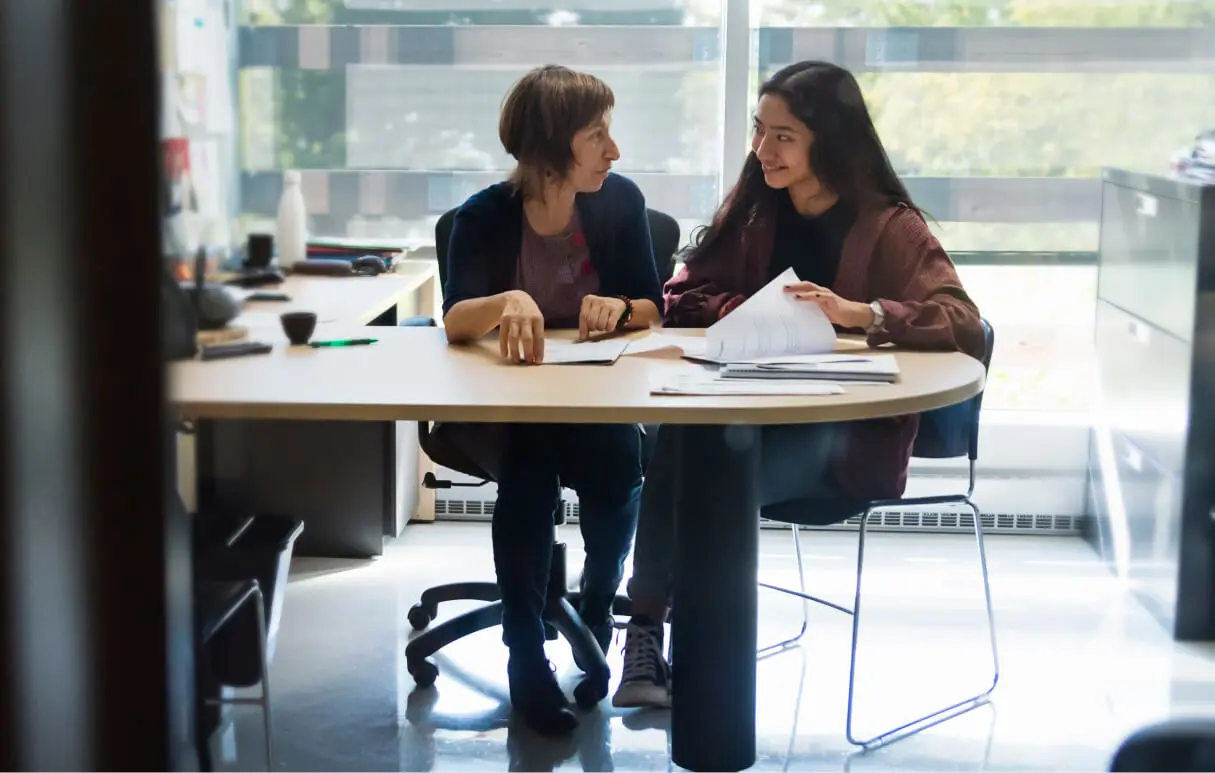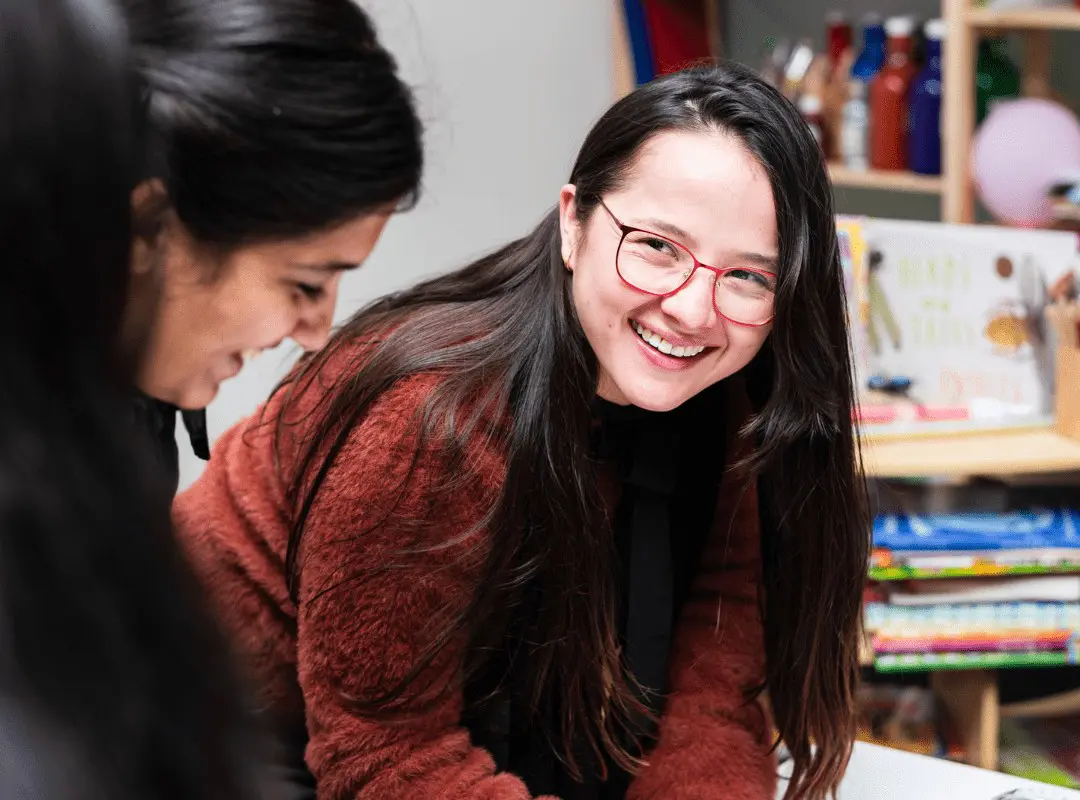Course Overview
Art therapy is a unique healing approach that benefits a wide range of clients, including children, adolescents, trauma survivors, individuals with disabilities, and those from diverse cultural backgrounds. It is particularly beneficial for those who may find it challenging to engage in more traditional talking therapies.
In our Bachelor of Arts Therapy, you will gain a comprehensive understanding of the latest knowledge and skills in arts psychotherapy. The focus is on how art processes can help people facing mental, emotional, or physical challenges. You will learn about art making and symbolic communication are used to facilitate healing outcomes. The course offers small-group experiential learning to develop your skills in a safe space and opportunities for industry connections to develop your future career prospects.
Make healing your masterpiece.
This qualification is FEE-HELP approved for eligible applicants.
Key Information
| Award | Bachelor of Arts Therapy |
| Duration | 3 Years Full Time (or Part Time Equivalent) |
| Study Mode | On-Campus Online* |
| Locations | Melbourne Sydney Online |
| Intakes | February, May, September |
| Course Fees | Domestic (FEE-HELP available) |
This course is exclusively available to domestic students commencing in 2026.
Trimester 2, 2026 Applications Now Open
Career Opportunities
The Bachelor of Arts Therapy prepares graduates for an exciting career as arts therapists with the skills to address the needs of clients in a variety of arts-based settings. Whether it’s mental health organisations, alcohol and drug centres, or other health centre agencies, your expertise will help you to make a significant difference.
Bachelor of Arts Therapy
Graduates may be eligible for tier membership with ANZACATA, the peak professional body representing creative arts therapists in Australia, New Zealand and the Asia/Pacific region.

Course Structure
You must successfully complete 23 subjects, totalling 144 credit points, to complete the Bachelor of Arts Therapy. Each subject is specifically designed to provide you with the essential skills and understanding to excel in the field of arts therapy. The course also includes two placement experiences.
If you plan to study full time, a full-time load is typically 8 subjects per year. For part-time students, you will typically complete 4 subjects per year. Please note that our academic year is structured into three trimesters, each consisting of 11 weeks of teaching followed by an assessment week.
Delivery & Workload
We’ve created a diverse and engaging learning environment for this course. Your study will involve a mix of lectures, tutorials, arts workshops, group discussions, self-directed study and workplace learning. For each subject, allocate about three hours for lectures and tutorials. Additionally, you should allow approximately 10 hours per week per subject for self-directed study to complete prescribed readings, practice skills, conduct research, and complete assessments at your own pace.
Subjects
Year 1
Year 2
Year 3
Electives
This subject, the first in a developmental sequence of study, sets the foundation for your knowledge and skills in counselling and integrative arts therapy practice. You will be introduced to a comprehensive theoretical framework for your practice encompassing person-centred and experiential psychotherapy, Eastern and Indigenous practices and psychodynamic interpersonal therapy originating in the work of Carl Rogers, Eugene Gendlin and significant humanistic-existential and psychodynamic theorists and practitioners.
Key concepts within this framework, such as the actualising tendency, the significance of developing ‘therapeutic relational depth,’ and the differentiation between the ‘real’ self and the externally constructed ‘false’ self, are examined. Additionally, you’ll explore ‘Dadirri’ deep listening, therapeutic presence, and engagement as foundational elements for your work, while also exploringo the differences between the therapeutic relationship with ‘relational depth’ and the ‘therapeutic alliance.’ The ultimate objective is to enable you to integrate experiential relational theory into your practice.
Subject Code: SOC101
Credit Points: 6
Co-Requisite: ART102 Integrative Arts Therapy in Practice
In the second subject in our developmental sequence of studying arts psychotherapy practice, you will have the opportunity to apply theory into practice. Through one-to-one therapeutic interactions with peers, you will share and collaborate on your own ‘lived experience’ in sessions. Using interventions and processes, you will build and strengthen therapeutic relationships and assist clients in exploring inner experiences.
You will be presented with situations that require the use of both foundation and intermediate counselling skills. You will also observe and reflect on the process of counselling within art therapy practice interactions. As part of the subject, you are also guided to reflect on how you apply micro-skills in integrative arts therapy within your practice.
Subject Code: ART102
Credit Points: 6
Co-Requisite: SOC101 Integrative Psychotherapy in Theory
This experiential subject focuses on the theory and art making practice of art therapy methodologies. You will examine the historical and philosophical foundations that have shaped art therapy as a distinct discipline. You will study the four methods of working therapeutically using art making as a process of self-awareness, change, healing, and transformation. These models include the expressive therapies continuum (ETC), person-centred (Rogerian) art therapy, analytical (Jungian) art therapy and mindfulness art therapy. Each model will be thoroughly explored, providing insight into its origins, terminology, and practical application through art making as a tool for change.
Engaging in experiential exercises each week will allow you to integrate the theory within each specific model and you will understand how art-making can be used therapeutically. You will also learn to use art-making as a form of communication and as a pathway to the subconscious. Additionally, you will have the opportunity to fully appreciate the ‘power’ of various art materials, learn how to guide the art-making process therapeutically, and understand when to introduce visual exercises and when to select or avoid certain media.
Subject Code: ART103
Credit Points: 6
This subject invites you to explore the lived experience of the art-maker using a wide variety of art media. Through interactive lectures and experiential learning, you will experiment with a variety of 2D and 3D art materials, discovering how their unique qualities can create physical and emotional responses in the artist.
You will work with both traditional and non-traditional art materials, including ready-made imagery, found objects, natural objects and the human body. Your artistic journey will involve creating art in response to external sensations and internal experiences, as well as creating public art and collaboration in constructing an art installation. You will also use the expressive therapies continuum to understand how artwork emerges from your own art-making process.
Subject Code: ART104
Credit Points: 6
This subject provides a comprehensive overview of mental health practice and the role of arts therapists in promoting mental health and wellbeing in clinical and community mental health settings.
You will explore the evolution of mental health concepts over time. The introduction of the DSM 5 will allow you to recognise important terms and significant categories within this manual, while also evaluating its strengths and limitations. Using the DSM 5, you will gain an understanding of mental health diagnosis and symptomology alongside personal accounts detailing real-life mental health challenges. This approach aims to provide insight into the lived experience of DSM 5 diagnosis and guide you to identify some of the limitations of the classification system in the real world. Additionally, phenomenological arts-based inquiries will extend your understanding of media and modality choices with such presentations. Case studies will also be used for class discussions and group activities and you will be introduced to the dynamic role of arts therapists in addressing clinically diagnosed presentations within a recovery model framework. The subject will also explore arts therapy practice within mental health facilities and community settings.
Subject Code: ART105
Credit Points: 6
In this subject, you’ll explore the ethical foundations of individual worldviews which can unconsciously shape prejudices and biases. You will gain the knowledge, skills and awareness required to engage in ethical and culturally mindful therapeutic practices. Through a curriculum focused on culture and diversity, independence, autonomy and philosophy, you will examine the versatility of embedded identities and their influence on beliefs, values and biases, both positive and negative. Awareness of stereotyping, privilege, poverty, racism, ageism, misogyny, homophobia and other forms of oppression will prepare you for addressing the worldviews and challenges of specific client groups.
Additionally, you will explore how minority stress can contribute to trauma, shame, interpersonal difficulties, self-criticism, lack of personal agency, anxiety and depression and how these experiences may influence the therapeutic relationship. You will also develop cross-cultural skills essential for working with diverse populations such as Aboriginal and Torres Strait Islander individuals, families and communities, learning how to approach their therapeutic needs and healing.
Ultimately the subject aims to foster an understanding that ethical behaviour and cultural competence extend beyond having an awareness of individual and cultural differences, embracing a commitment to eliminate unconscious bias and discrimination in therapeutic practice.
Subject Code: SOC106
Credit Points: 6
This subject is designed to develop your understanding of ethical and legal issues critical to arts therapy practice. You will learn about ethical principles and frameworks guiding behaviour and decision-making, including relevant legislation, professional practice standards and codes of ethics within the Australian professional landscape. By analysing real-world scenarios, you’ll learn to identify ethical and legal issues and propose solutions to dilemmas common in therapeutic practice, including those relating to professional responsibilities, professional boundaries, dual relationships, artworks, and e-art therapy. You will also explore how your personal values may influence your behaviour, decision-making and the development of your professional identity. Ultimately, this subject integrates personal art practice, philosophy, and art therapy in a practical and comprehensive manner.
Subject Code: ART107
Credit Points: 6
Arts Therapy in Group Practice is an experiential art therapy subject which offers students both theory and group-work participation to fully understand Group Art Therapy. Students will learn the historical and philosophical foundations of group-work and particularly art therapy group-work.
Students will learn the fundamentals of group-work, such as planning, set up, beginnings/endings, creative methods, managing group participants, key concepts, themes, patterns of behaviour, and facilitating group work.
This subject is experiential; each student will have an opportunity to facilitate a one-hour art therapy group. In this way students can experience working as an art therapist in a safe learning environment. This is part of the assessment requirements for this subject.
Each week students will experience group art therapy and be able to understand the theory in relation to their participation in group-work. Consequently, students have a chance to make art in group-work and experience how art therapy groupwork can lead to change and growth.
Students will have an opportunity to fully appreciate various art materials, how to manage and guide the art making process therapeutically, and how to introduce and manage visual exercises.
Subject Code: ART108
Credit Points: 6
Pre-Requisites: Integrative Psychotherapy in Theory, Integrative Arts Psychotherapy in Practice
This subject explores key issues, theories, and methods in developmental psychology and life span development. An interdisciplinary approach is taken to examine life development from both evolutionary and cultural perspectives. By studying themes of evolution, embryology, attachment, and cultural history, you will gain a deeper awareness of life development in relation to nature and nurture. The subject also provides an overview of abnormal development and important human developmental stages.
Subject Code: SOC201
Credit Points: 6
In this subject, you will explore a diverse range of expressive art modalities including storytelling, movement, dance, voice, music, drama, and sand tray. By combining these modalities, you will be able to express your thoughts and feelings, communicate non-verbally, gain insight and discover the healing potential of the expressive process. You will also learn to apply the eight core processes common to expressive arts therapies, as outlined by Jones (2005), using expressive modalities to convey inner experiences. Additionally, you will gain first-hand experience in the multimodal use of expressive arts for processing implicit and explicit psychological content. We will also highlight the importance of creating a ‘state of play’ to facilitate expressive arts.
Subject Code: ART202
Credit Points: 6
In this subject, you will learn about the foundational theory, philosophy, and practice of an intermodal arts therapy approach. A phenomenological view of the self will be explored through philosophy and relevant psychological theories. Through practical engagement with intermodal arts therapy, you’ll integrate your understanding of self and the principles of intermodal arts therapy into practice. Additionally, you’ll learn and apply an arts therapy case formulation model.
Subject Code: ART203
Credit Points: 6
This subject explores the integration of movement into multimodal arts practice. You will explore the historical and philosophical foundations of societal perceptions of the body and their current implications. Fundamental concepts of body-psychotherapy and movement-based therapies will be part of your learning. You will gain hands-on experience with movement-based interventions, integrate them into psychotherapeutic and arts-therapeutic settings, and examine the ethical considerations involved with these interventions.
You will also explore the phenomenological, neurobiological, and developmental aspects of movement and the developing body, and engage in experiential explorations into your phenomenology with a focus on memory, intersubjectivity, aesthetics, embodiment and agency. Furthermore, you will explore ideas such as embodied affectivity and inter-bodily resonance as it relates to the embodied therapeutic relationship.
Subject Code: ART204
Credit Points: 6
Arts therapy practice relies on understanding how creativity and healing work together. In this subject, you’ll explore the historical and mythical roots of arts therapy, gaining deep insights. By studying the artistic expressions of ancient cultures, including their symbols, ceremonies, and rituals, you’ll connect personal and collective experiences. A key part of this exploration involves looking at the hero’s journey, commonly known as monomyth, as a guide for healing. You’ll also examine how this applies to universal human experiences like loss, isolation, and the search for meaning.
Additionally, you’ll consider how existential philosophy and theory intersect with arts therapy. You’ll also learn about the connection between neuroscience and art therapy research, which offers insights into the relationship between creativity, healing, and the important role of art therapists as catalysts for change. To facilitate learning, we’ll use engaging case studies for class discussions and collaborative exercises. Hands-on visual art activities will also be part of the learning experience.
The goal of this subject is to help you see personal struggles and challenges, both in your life and in the lives of potential clients, as opportunities for reflection, growth, and finding meaning. This new perspective aims to empower you to embrace optimism and purpose in your journey and to guide your clients toward a brighter path.
Subject Code: ART205
Credit Points: 6
See the ‘Electives’ tab for current elective options available.
This subject will introduce you to the use of theatre art in psychotherapy. You will learn about the history and development of drama therapies, from ancient rituals to modern theatre, through performance theory. By examining your own dramatic history using role theory, you will gain insight into how psychodrama and social roles influence your everyday identity. You will also develop therapeutic skills by practicing various psychodramatic action methods, mask work, and puppetry, and studying an integrative drama therapy process. Throughout the subject, you will have the chance to reflect on your experiences and consider how theatre arts can be used to explore and achieve therapeutic goals.
Subject Code: ART207
Credit Points: 6
This subject introduces evidence-based art therapy assessment and hypothesis development, focusing on case conceptualisation within case management. You will learn to effectively formulate a case, create a meaningful narrative, and understand the client’s presenting concerns in the context of their phenomenology and current life situation. Using case formulation frameworks, you will hypothesise and identify client concerns, understand the origins of these difficulties, and recognise the client’s strengths. Additionally, you will be introduced to art therapy assessments and supplementary tools to gather relevant data, which will prepare you to plan interventions, carry out treatment plans, and assess the overall effectiveness of your case analysis as an art therapist. Overall, this subject provides insight into allied health practices and terminology while maintaining the core principles of art therapy.
Subject Code: ART208
Credit Points: 6
Pre-Requisites: SOC201 Life Span Development, ART203 Intermodal Philosophy and Theory
This subject builds on content in previous subjects, bringing together integrative understandings of trauma and its effects, and providing both theoretical and practical knowledge of trauma-informed approaches in arts therapy. You will learn about the historical role of arts in symbolising and integrating traumatic experiences, gain a deeper understanding of integrative processes, and study the polyvagal theory of autonomic nervous system functioning and co-regulation for creating therapeutic safety. You will also consider constructivist and sensorimotor approaches in art therapy practice and strategies for working with children, addressing cultural considerations in trauma treatment, and ensuring therapist safety when working with trauma.
Subject Code: ART301
Credit Points: 6
This subject supports students to develop ethical, reflexive, and culturally responsive practices when working with Aboriginal and Torres Strait Islander clients. Through experiential learning, critical self-inquiry, narrative and creative processes, students will engage with Australia’s colonial history, Indigenous worldviews and key cultural protocols. Grounded in the values of respect, safety, communication, reflection, advocacy and cultural responsiveness, this subject aims to challenge unconscious bias and equip students with the tools to navigate ethical dilemmas in the provision of trauma-informed care in cross-cultural therapeutic contexts. Through critical discussion and case studies, students will develop a deeper understanding of relationality, Country, Aboriginal and Torres Strait Islander social and emotional wellbeing, the principles and practices for decolonising therapy aligned with their professional context, and the responsibility of the helping professions in supporting healing and justice.
Subject Code: SOC312
Credit Points: 6
See the ‘Electives’ tab for current elective options available.
In this subject, you will learn how to use expressive arts therapy to build relationships and attachments with children. Building on child development theories from Life Span Development, we will explore the experiences of children facing challenges in infancy, early childhood, and middle childhood such as adversity, trauma, grief, social, emotional, behavioural and mental health difficulties, as well as neurodivergence. You will learn practical techniques to help children express their thoughts, emotions, and experiences using visual arts, drama, play, sand tray, music and movement.
Subject Code: ART304
Credit Points: 6
Pre-requisite: SOC201 Life Span Development
This experiential subject brings together key learnings across the course, with a strong emphasis on conducting art therapy sessions. It focuses on the necessary skills, attributes and competencies for art-based therapeutic practice, including addressing ethical requirements. Your ability to conduct an art therapy session effectively, coherently, and safely will be evaluated through a clinical skills presentation. The assessment emphasises your adaptability and spontaneity, especially in intermodal and multimodal practice. Your clinical effectiveness in interpreting implicit cues, non-verbal communication, metaphor, and imagery will also be evaluated. The subject also highlights the importance of reflecting on your practice and its connection to therapeutic presence and interpersonal neurobiology.
Subject Code: ART305
Credit Points: 6
Co-Requisite: ART306 Supervised Arts Therapy Practice A
This subject is the first of two professional experience subjects utilising an integrated approach to arts therapy designed to draw together theory, knowledge and skills in coursework in a safe, supported and supervised work-based setting. In this subject, students will have their first opportunity to apply theoretical and reflective learning to arts therapy practice as they undertake 120 placement hours at an approved host organisation.
Students will facilitate creative arts explorations with an entry level arts therapy case load with a focus on building therapeutic relationships, ethical and culturally sensitive arts therapy practice, understanding their role in different practice contexts, and working as part of a multidisciplinary team. Students will participate in group supervision and engage in reflective discussion and art making to explore their clinical reasoning, the client experience, therapeutic relationships, and their developing identity as a graduate arts therapist.
Subject Code: ART306
Credit Points: 6
Hours: 120
Co-Requisite: ART305 Integrating the Arts and Practice
Pre-Requisites: All Year 1 and Year 2 core subjects
This subject is the second of two placement subjects utilising an integrated approach to arts therapy designed to draw together theory, knowledge and skills in coursework in a safe, supported and supervised work-based setting.
As the capstone experience, students will continue to develop their clinical skills as they carry a small arts therapy case load under supervision as part of a 240-hour placement experience. Students will design and implement ethical and culturally sensitive arts-based programs with individuals and groups to facilitate positive change with consideration for the needs and goals of the client. In doing so, students will exercise ethical thinking and decision making and develop their clinical skills with a focus on therapeutic relationships, clinical case discussion, record keeping, and working as part of interdisciplinary teams to integrate arts-based methods and frameworks in different practice contexts.
Students will share and examine case material through supervision and reflective practice to deepen their understanding of evidence-based arts therapy practice, clinical reasoning, client experiences and therapeutic engagement, and use this learning to articulate a philosophy of practice as a graduate arts therapist.
Subject Code: ART307
Credit Points: 12
Hours: 240
Pre-Requisites: All Year 1, Year 2 and Year 3 core subjects
This subject explores the historical development of using various sand and miniatures for expressive purposes, providing insight into symbolic thinking and meaning making, mythology, archetypes and complexes, and the therapeutic progression of Jungian psychology. In preparation for working with children in a Jungian way, you will become familiar with Erich Neumann’s child developmental stages and examine case material of child sandplay to observe and analyse Neumann’s stages in the sand. You will learn how to facilitate an adult sand and symbol process by experientially engaging with the sand, water, and figurines, examining the case material of adult sandplay, and exploring the archetypal meaning of symbols. Creating four sand trays in a ‘safe and protected space,’ you will have the opportunity to connect with emotional experiences and life narratives through the sand pictures. You will also learn to engage with six levels of reflection from empathic to transcendent (Carroll & Gilbert, 2011, p.115) as a structure for evaluating your clinical work.
Subject Code: SOCE202
Credit Points: 6
This subject equips you with the skills to integrate ecopsychotherapy into your practice by linking human psychological wellness to the ecological system. Through an experiential retreat in a natural setting, you will receive training in ecopsychotherapy techniques and theoretical frameworks, including mindfulness practices, Indigenous wisdom, and depth psychology. This retreat focuses on reconnecting with nature and addresses fundamental issues such as safety, confidentiality, and the need to acknowledge the traditional peoples of the lands where the retreats are held.
Ecopsychotherapy acts as a means to dissolve the perceived separation between individuals and nature, offering exercises to facilitate reconnection to the natural world. The subject also highlights the post-colonial need to acknowledge the traditional peoples of the retreat lands and engage in reciprocal relationships with Aboriginal Australians, including the importance of respecting Elders and Traditional Owners past, present and emerging. Your success in this subject will be determined by your motivation to engage with the core concepts of ecopsychotherapy practice.
Please note: Due to the delivery style for this subject, extra costs may be incurred to cover travel, accommodation and food.
Subject Code: SOCE203
Credit Points: 6
This subject will enable students to develop both a sound understanding and familiarity with the techniques of case management concerning central issues around grief, loss and bereavement in the psychotherapeutic process. This will involve acquisition of skills, knowledge and an understanding of appropriate interventions for different grief and loss contexts and presentations. The subject will also focus on the cultural, sociological, and ethical aspects of working with these themes.
Subject Code: ARTE206
Credit Points: 6
Pre-Requisites: None
This subject focuses on the knowledge and skills required to apply therapeutic skills to work with young people (12-24 years).
Students will build on their understanding of key theories and models of child and adolescent development, attending to common issues facing young people in contemporary society. Students explore evidence-based strategies for engaging and working with young people in diverse therapeutic contexts. A systems perspective is applied to the assessment of young people’s circumstances and to the adaptation of approaches in response to the developmental, familial, organisational, community, and socio-cultural contexts shaping young people’s lives.
Students will practice, develop, and critically reflect on skills in relationship and rapport building and culturally responsive therapeutic approaches with young people. This includes examination of how resources and physical environment can be employed to enhance engagement and practice. Emphasis is also placed on the personal and professional competencies required to work effectively in response to relevant legislation; confidentiality; informed assent/consent; and duty of care with young people under the age of 18. Students also learn about strategies to engage families, parents, caregivers, schools, and other service providers in the therapeutic process.
Subject Code: COUE301
Credit Points: 6
Pre-Requisites: None
This subject aims to deepen your understanding of the science and research behind dream work and the resources of the human psyche that produces dreams. It looks at how the dreaming function can use internal resources to address problem-solving, stress management, knowledge and understanding, change management and psychological development. The subject explores experiences in dreaming, liminal, conscious imaging, and metaphoric states of consciousness You will also learn to use various methods, including Jungian and archetypal processes, in both individual and group settings, to tap into these states of consciousness. These methods are developed as part of your integrative symbol and dreamwork skillset.
Subject Code: SOCE302
Credit Points: 6
This subject explores the themes of personal growth and awakening. It follows an intensive format with a structured program involving personal reflection, practice and lectures, exploring themes related to the organisation of the mind. You will begin learning about early developmental factors in mind formation, and progress towards transpersonal psychology and Eastern philosophies and practices.
Subject Code: SOCE303
Credit Points: 6

Recognition of Prior Learning
At Ikon, your past studies or work experience can be acknowledged through Recognition of Prior Learning (RPL) or Credit Transfer.
RPL evaluates your previous skills and experience against the learning outcomes of Ikon subjects, potentially exempting you from studying certain subjects. Credit Transfer allows your previous studies to contribute towards your qualification, granting credits based on matched content and learning outcomes between equivalent qualifications. These pathways could help you to fast track your qualification, reducing study time and tuition fees.
Study Pathways
Credit Pathways
Our Diploma of Arts Therapy graduates can advance directly into the second year of our Bachelor of Arts Therapy. Eligible applicants will be guaranteed 48 credit points out of a total of 144 points for our Bachelor of Arts Therapy.
Exit Pathways
After successfully completing the first year of the Bachelor of Arts Therapy, you may choose to leave the course and exit with the award of Diploma of Arts Therapy. Similarly, if you successfully complete two years of the Bachelor of Arts Therapy and decide to not continue your degree studies, you may exit with the award of Associate Degree of Arts Therapy.

Entry Requirements
Domestic Students
Our entry pathways include:
- Recent Senior Secondary Education: This applies to those who have completed an Australian Senior Secondary Certificate (Year 12) or its equivalent within the past two years. For guaranteed entry, an ATAR of 65 is required.
- Applicants with Higher Education (HE) study must have undertaken a higher education qualification (or, partially completed a higher education qualification).
- Vocational Education and Training (VET) study: This requires completion of a vocational qualification at Diploma level or higher.
- Work/Life experience: If you have left senior secondary education more than two years prior to your application and have not undertaken VET or higher education study since then, you may be eligible based on your professional or work experience and/or any non-formal courses taken in preparation for tertiary study or relevant to the subject area. You must also submit a written admission statement outlining your reasons for pursuing the Bachelor of Arts Therapy. For more information about writing your admissions statement, click here.
All applicants must complete the Learner Questionnaire found in the Application Form, demonstrating their inherent qualities and motivations to succeed in the course. You may also be asked to participate in an informal interview with an Ikon representative.
To discuss the most suitable pathway for your circumstances, please contact us at 1300 613 801 Domestic: Ext 1, or email us on [email protected].
For more information, please refer to the following:
Student Profile
Application Process
Student Admission Policy
Inherent Requirements
Find Out More!
Complete the form below to download our course brochure and find out more about the Bachelor of Arts Therapy.

